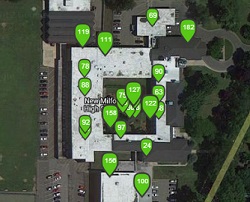
Author of books such as Learning Transformed, Eric Sheninger is a senior fellow and thought leader on digital leadership with the International Center for Leadership in Education (ICLE). Prior to this he was the award-winning Principal at New Milford High School. Under his leadership his school became a globally recognised model for innovative practices. Eric oversaw the successful implementation of several sustainable change initiatives that radically transformed the learning culture at his school while increasing achievement.
To discuss how school leaders can make the most of their roles, we sat down with Eric Sheninger; best-selling author, international keynote speaker and International Center for Leadership in Education senior fellow. Eric is based in Cypress, Texas, and was the award-winning principal at New Milford High School in New Jersey.
Education is ripe for disruptive change, leading to innovative practices that improve learning outcomes for our students. What might have worked in the past will not necessarily have the same impact today, as the world has changed dramatically in a short period of time. It’s safe to say that the seismic shifts we are witnessing as a result of technological advances will continue to reshape our world in ways that we could never have imagined. Disruption has become commonplace in the new world, and organisations have moved from adaptation to evolution in order to not only survive, but more importantly, thrive.
What is the most important change you can make to your BYOD programme? For Principal Eric Sheninger, it was doing away with writing out a user name and password for every student who wanted to gain access to the network. Together with good policies and infrastructure, he argues, trust and respect for students is vital for a successful BYOD strategy.

My first ever post on the topic just provided a small glimpse at the possibilities inherent when students are empowered to use the technology that they already posses to enhance their learning experience.
It was our desire and quest to create a school culture and learning environments that were more reminiscent of the real world that our learners would soon be a part of that drove change in this area.
When I reflect upon how the program has evolved into it's current state I cannot help but to think about the most important change that was made recently.
Why is social media such a hotly contested topic in schools? There are many ways, as Principal Eric Sheninger explains, in which schools can harness social media and blogging to demonstrate the relevance of learning, and introduce the 'real world' audience to students.

Social Media is bad and has no place in education. It is a distraction to the teaching and learning process. If students are allowed to use social media in school they will stay off task or exhibit inappropriate behavior. Worse, teachers will spend countless hours 'socialising' instead of educating.
This is the misguided stigma that social media carries and, as a result, it is often banned in schools. However, there are a growing number of passionate educators who have embraced social media as a powerful tool for learning. When you look at how reliant the world is when it comes to using social media, these educators look like geniuses.
Photo credit: Jason A. Howie

A community-driven platform for showcasing the latest innovations and voices in schools
Pioneer House
North Road
Ellesmere Port
CH65 1AD
United Kingdom